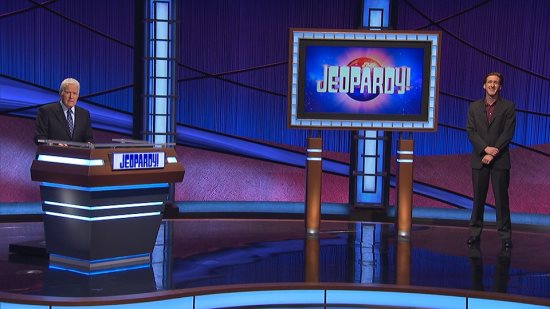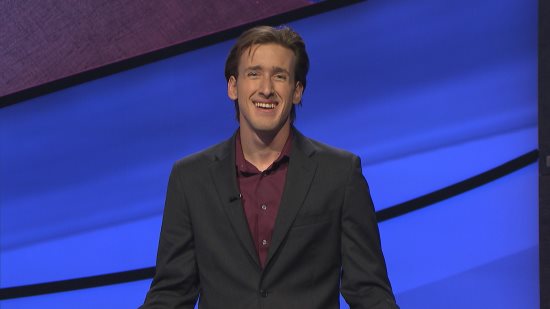
| ||||||
Baer graduated from Acalanes High School in 2014 and from Caltech with a degree in computer science. While at Caltech, Baer applied for the "Jeopardy College Tournament" but he was turned down. He applied again and was then chosen as the first alternate for the tournament. Since no one dropped out, all he could do was watch the tournament along with the studio audience.
Two years later, he received a call from the show. "They called me last January and said I should apply again, which I did," said Baer, who now lives and works in San Francisco for a small company named Merge, which is building a platform to facilitate the movement of data between enterprise software. "With the onset of the COVID-19 virus, I did not hear anything. Then this past September, they finally called me and gave me nine days to come down to Los Angeles as a contestant which I immediately agreed to."
Most people would drop everything and pore through the J! Archive which lists every "Jeopardy answer" for the last 37 years but Baer had a prior commitment: "I spent the entire week hiking with a friend so I did not start prepping that hard until the weekend before."
After that, Baer was focused entirely on "Jeopardy" preparation: "I spent about 14 hours a day reading old `Jeopardy' answers. I figured there was not that much I could learn in three days, but what I got was an understanding of what the responses writers were going for, learning their style and the way they like to hint at things."
Performing in front of a national audience only affected Baer a little. "I think I had stage fright the entire time, though I did get more comfortable as the game went on. I just stayed focused on playing the game and did not think too much about what I was saying or doing. I was just having fun playing the game."
Ironically, it was not what Baer learned at Caltech that was the ideal preparation for the show. "The things you learn at Caltech and what shows up on `Jeopardy' are completely independent of each other, apart from the occasional science question," Baer said. "Actually, what prepared me the most was my participation in Quiz Bowl (a general knowledge game) which I participated in from middle school through college."
The "Jeopardy" staff do their best to make the contestants feel comfortable, even during a pandemic, Baer said: "We all got COVID-19 tests right before the show and temperature checks when we got in. The audience was only made up of other contestants and the crew. They were incredibly sweet people. I was told to bring several changes of clothes but I just brought the two monochromed shirts that I owned and planned to switch back and forth."
The first show began at 9:30 a.m. and there was 20-minute break between games, which was just enough time for Baer to change his shirt.
The interaction with Alex Trebek, the show's longtime host, and the contestants was kept at a minimum, said Baer. "It was kind of surreal. You're waiting for the game to start and Alex just popped out from behind the board as the show began. After each game, he would come over and talk with us about the game we had just played."
Baer had planned to make a round of posts about his upcoming appearance, but when Trebek passed away, Baer `low keyed it' because "I did not want to play it up at that point, though I did tell my family, co-workers and close friends."
Baer adjusted in his first game as he was trailing the leader in Double Jeopardy (the last round). "At that point, I realized that I needed to take more chances. When I got the daily double, I bet everything because if I missed that question, there would be no chance I could win so I put it all on the line (successfully). My other strategy was to keep a fast-enough pace to prevent the other players from getting too comfortable."
After two wins and a second-place finish, Baer walked away with a total of $63,800, before taxes. Baer is keeping his earnings in perspective: "Since I am starting a new job with a small company, I'm just going to be saving the money which will let me focus on my job at this point."
Coincidently, Baer crossed paths with a player named Gabe Ostler who was waiting for his name to be called: "Gabe graduated from Miramonte and we swam against each other through high school."
After the shows aired, Baer heard from a long-lost relative: "I heard from a second cousin who I had never met and somehow he remembered me from his genealogy research. He told me that I was his grandfather's brother's great grandson. He then sent me an insane amount of genealogy research that I had never seen before."

Reach the reporter at:
